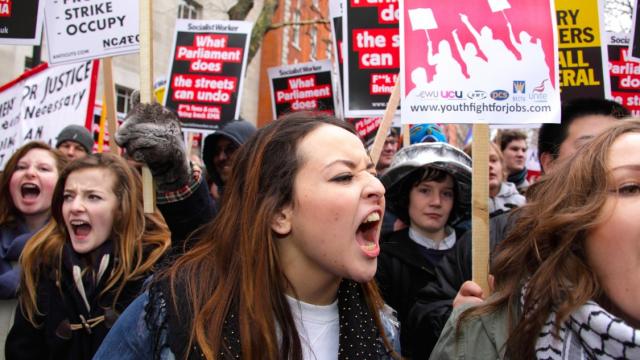
The outbreak of the global financial crisis in 2008 has been considered, by many, a turning point in the ways we come to understand our world. Established worldviews and fixed mindsets are confronted with the rapidly changing interrelations between the social, the political and the economic domain. These developments pose a challenge to our daily social experiences, as well as to academic social analysis, while at the same time giving birth to new opportunities for social change.
In thinking about these developments, the latest book by Cristina Flesher Fominaya, Social Movements and Globalization: How Protests, Occupations and Uprisings are Changing the World, comes as a careful dissection of some of the most intriguing concepts relevant to the economic and political processes of the last century and the enduring desire for social transformation. Flesher Fominaya provides us with a master compilation of all that catches our attention, grasps our interest and urges our understanding.
Why do social movements matter? What is their relevance in a globalized world? How are they shaped by globalization? How do they shape globalizing processes? These are only some of the burning questions that Social Movements and Globalization comes up against. Neoliberal economic globalization fueling social inequalities, the precarity of labor, and the degradation of the environment have, among other things, created new areas of contestation and resistance that bring about new threats to social movements, but that also provide them with a new arsenal of tactics and strategies.
Associations between local, national and global acts of resistance are progressively built, strengthening movements’ responses to the advancement of neoliberal globalization. Yet the core challenge of overcoming differences between national contexts persists. Cleavages along gender, class and race lines within movements are placed at the center of the discussion, and the tension between autonomous and institutionalized forms of movement organizing is alive and kicking.
Social Movements and Globalization provides us with an anatomy of the relationships between social movements, globalization and the pathways to social change. With or without prior knowledge of the field, the reader can find special interest in the methodical exploration of definitions and conceptual distinctions.
Combined with a systematic exposition of protest events, mobilizations and movement cases, Flesher Fominaya smoothly introduces the reader to the direct experiences of contemporary social movements and the way these are reflected in central theoretical debates. A strong conceptual grounding is progressively built up throughout the book, always in direct reference to notable mobilizations and momentous movements, making the storyline clear and the many aspects of contemporary movement activism comprehensible.
Based on a well documented presentation of movements’ and mobilizations’ organizational and functional characteristics, Social Movements and Globalization revisits all the major issues that those new to social movements want to explore and those familiar with social movement activism and studies want to remember.
More than a comprehensive overview, however, the book is also a brave critique of progressive political automatism and the linear progression of social movements. Instead of political actors confined within the limits of overtly political aspects, Flesher Fominaya provides us with an insightful account of social movements as key expressions of enduring struggles for social transformation. "Cultural resistance" is the key challenge for progressive contemporary movements seeking to resist a system of hegemonic ideologies and to delegitimize oppression and inequality.
If we were to ask for anything more from this remarkable account of contemporary movements, it would be a more comprehensive account of conservative and right-wing movements, which are only very briefly touched upon. Flesher Fominaya, however, leaves no room for doubt about their relevance; they are “extremely important political actors responding to globalization processes” and merit greater attention.
Indeed, the largely understudied regressive movements mobilizing for social and political setback, are unequivocally significant actors vis-à-vis movements that exercise a fundamental (anti-systemic) critique to the globalization of neoliberal capitalism.
The deliberate omission of regressive movements from the analysis, however, leaves no doubts about the importance of Flesher Fominaya’s new endeavor. Social Movements and Globalization is a brave look into the complex associations of social movements, globalization, social theory and the practice of movement activism in the pursuit of social change.
Originally published by Roar Mag
3 WAYS TO SHOW YOUR SUPPORT
- Log in to post comments















